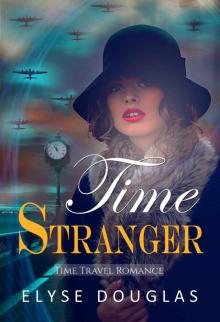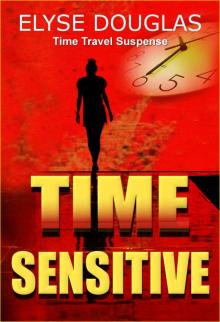- Home
- Elyse Douglas
The Lost Mata Hari Ring Page 2
The Lost Mata Hari Ring Read online
Page 2
“What did they say? Did they take you to see a doctor?”
“Yes, my father is so good to me. He's taken me several times, but the doctors don't find anything. They say it's probably stress because I work so hard at being a good dancer. I want to be a dancer and singer someday. I love dancing.”
“Okay, Trace, very good. Now, Trace, I want you to just relax and drift back to an earlier time. What I want you to do, and please listen very carefully… What I want you to do is to go to the source of that pain you feel in your chest. I want you to tell me where you were the first time you felt this pain in your chest. Okay, Trace. When I count to three, I want you to go there. Understand?”
“Yes.”
“One… Two… Three. Go there now. Where were you? What were you doing? Okay, Trace, go to that very first time—that event—and tell me what you see.”
Trace swallowed, and her head shook, her face suddenly filled with alarm. “No….No. I….”
“It’s all right, Trace. No harm will come to you. I want you to simply stand aside from the event, and just watch it as if you’re watching a movie. You will not feel any emotion or fear. You will just be observing. Can you do that, Trace? You will be safe.”
Trace’s eyelids twitched, and her breath quickened. “I…well, I just…No, not… over there. That place. No. I’m not going over there. No!”
“Just relax, Trace, everything is fine. You are perfectly safe. Now, gently, go to the first time you felt the pain in your chest, and tell me what you see.”
The silence lengthened, and Dr. Hopkins saw Trace’s hands poke out from under the blanket and form fists.
Dr. Hopkins gently tapped Trace on the center of her forehead and said, “Go there now, Trace.”
Trace began to tremble. When she spoke, her voice was low, hoarse and angry.
“Je ne peux pas le croire. Même en ce moment! Je n’ai rien fait de mauvais.”
Dr. Hopkins stared in confusion. “What was that, Trace? What did you say?”
The voice was strident. “Qui est ce que c’est, ce Trace?”
Dr. Hopkins stiffened, bewildered. “I only speak a little French. Will you please speak to me in English?”
“Monsieur, don’t you understand? I am not this Trace, whoever that is. I am not—and do not call me by this name. Don’t you understand, you fool? I did nothing wrong. They are sending me to my death!”
CHAPTER 2
Visibly shaken, Dr. Hopkins reached for a glass of water and took two quick sips. He gathered himself and leaned in closer, almost whispering.
“Relax, Trace,” Dr. Hopkins said, fighting for calm, his own voice quivering. He reached for a tissue and dabbed at his damp forehead.
“I want you to rise above what is going on. Do you understand? You won’t feel fear or pain. You will just watch what is happening, like an observer, and calmly tell me what is happening, in English. Do you understand? Please speak in English.”
There was a long pause, as the stress lines around Trace’s mouth and eyes relaxed.
“Yes, I understand.”
“Okay, good. Fine. What is going on now?”
Trace’s voice lowered and sounded mechanical.
The voice began in French again. “Ils arrivent me cherchez. Je veux écrire trois lettres. Je dois les écrire.”
“English, please. Can you please speak to me in English?”
“English?” the voice, sounded distracted. “They are coming for me. I want to write three letters. I have to write them.”
Trace began to shake, the emotion returning.
“Relax, Trace,” Dr. Hopkins said. “Just relax and observe.”
“Do not call me Trace, Monsieur.”
“Okay. How old are you?”
“What does that matter now, Monsieur? Do not ask such a question to a lady. It is rude.”
Dr. Hopkins didn’t understand what was happening. Nothing like this had ever happened to him before. Of course, he’d read about such things—regression leading into past lives—but he was not a believer. He did not believe in reincarnation. So, had he tapped into a multiple personality? He considered himself to be a scientist and a doctor, and as a scientist, he had to continue this line of questioning to understand and learn what exactly was going on.
“What is happening now?”
“I’m scared. So scared.”
“Where are you?”
“In my cell.”
“Cell, what cell? Where are you?”
“I’m in prison, Monsieur, in prison.”
Dr. Hopkins removed his glasses. “What prison?”
“Prison Saint-Lazare, in Paris.”
“Paris?” Dr. Hopkins asked, struggling to keep the emotion out of his voice. “What year is this?”
“What year? 1917, of course.”
Dr. Hopkins sat frozen for a minute, his pulse rising. “Paris, 1917? Are you certain?”
“Of course, I am certain. Bien sur, I know what year it is, Monsieur. It is October 15, 1917. Of course, I know this day, of all days.”
“Okay… Okay, just relax now. Okay…” Dr. Hopkins was flustered, but he had to go on. “Okay, fine. Can you please tell me your name? Your full name?”
“Margaretha Geertruida Zelle.”
Dr. Hopkins’ eyes flitted about as he searched for the right questions to ask. He stammered. “All right. Fine. All right. How old are you?”
“Why do you ask such a thing again? I am 41 years old.”
Dr. Hopkins faltered, then pushed on. “You are 41 years old?”
“That is what I said, Monsieur,” she said, caustically. “Why do you keep asking me what I have already told you?”
“Okay, fine. And… And you say you’re in a cell in the prison Saint-Lazare?”
“Yes, I told you that. Yes. Where else? It is a lice-infested, rat-infested hell hole. But it doesn't matter anymore does it, Monsieur? I'm soon to be killed for nothing. Nothing! Do you hear me? I am innocent of these ridiculous charges!”
“Okay. Please continue to tell me what is happening.”
“Sister Leonide is with me, and my lawyer, who was once my lover.”
“And who is your lawyer?”
“Edouard Clunet. He looks so much older now than his 74 years. He is too distressed to speak. He tried his best to save me but that pig, the military prosecutor Capt. Pierre Bouchardon, had it in for me anyway, didn’t he?”
“Okay, okay, what is happening now? Please describe all that you can.”
“From the meager wardrobe that they let me keep in this rat prison, I am wearing my pearl-gray dress with a wide skirt and lace cache-corset at the bosom. I’m wearing my tricorn felt hat and a pair of buttoned shoes. I had to cut my hair short because of the prison rules, but I will still hold my head high with dignity. Those bastards will not see me cry. The Baptist prison chaplain is about to baptize me.”
Trace took in a deep, bracing breath.
“Please go on…” Dr. Hopkins said, his own breathing coming fast.
“Sister Leonide is clasping me by the shoulders and holding me close. Her eyes have filled with tears. She is so good and so kind. I tell her, ‘Don't be afraid, Sister, I have lived, and I know how to die.'“
Dr. Hopkins broke in. “Okay, relax now and remember that whatever happens, you are just observing it. You will not be harmed. You can leave that scene at any time.”
“And go where, Monsieur? There is nowhere to go. It is time, you know. Time to go. I throw a blue coat over my shoulders. Now the male warden is taking my arm. I brush him away, that pig! I tell him ‘I am not a criminal.’”
Dr. Hopkins again wiped his sweaty brow. “Please continue. Please go on.”
“I have accompanied the execution party down the steps to a ground-floor office. I want to write three letters.”
“Letters to whom?”
“The most important one is to Juana-Luisa, my dear little Nonnie. Oh God, how I love her. And how wrong I have been. I have been so wrong ab
out my little Nonnie.”
“Who is Nonnie?”
“Don’t you know, Monsieur? Nonnie is my daughter. She is 19 years old now, and she is a beautiful girl. I have heard she looks like me. I have prayed to God that He let me see her one last time. I have prayed to the Blessed Virgin that she send Nonnie to me. It has been my biggest sin, you see. I left my little girl, and now I will never see her again.”
“Where is Nonnie now?”
Trace’s voice was choked with emotion. “She is with her father, in De Steeg. If only I could see her once more, then I wouldn’t mind dying so much. If only I could make my peace with her and tell her how much I love her. How I had hoped she would write to me when she heard I was here, but she didn’t. I received no letters from her. She must hate me, Monsieur, and I shall never rest in my grave knowing that I have hurt her so badly.”
“Can you write to her now?” Dr. Hopkins asked.
“Yes, they will let me. I must also write to my lover, Captain Vadime de Masloff, and to the Baron de Marguerie. None of them came to see me. I thought—I believed to this last hour that Nonnie would come to see her mother one last time. I thought Vadime would come. I thought he loved me. But now I am alone…left all alone. What have I done to be left so alone during my last hours?”
Emotion returned to her voice. “Why didn’t Vadime come? Why didn’t my daughter come? Was I so bad a woman?”
Dr. Hopkins swallowed. “Relax, now. Please, take a few breaths and relax, and when you’re ready, continue to tell me what is happening, in English.”
“Are you going to watch, too, Monsieur, like all the other scoffers?”
“No, I’m not. Please continue.”
“I write my three letters and I hand them to Monsieur Clunet. He promises me they will be posted. I tell him, the letter to Nonnie must be delivered, and he assures me it will be. Outside the prison, I see the crowds. They are silent, watching me. In the street, the drivers crank the cars. A gendarme leads Sister Leonide and me to a large sedan. We are soon on our way, and as we pass through the silent streets, my head is held high. It is about half-past five in the morning and the sun is not fully up. How desolate and sad the world looks. How sick inside I feel. We are arriving at the old castle-palace of Vincennes, onto a wide field used for cavalry displays. As my car bumps across the muddy field, I see troops assembled. I must take a breath. It won’t be long now. I am terrified, but I will not show my terror to anyone. The automobile stops, and I am the last to leave the car. I hear a bugle call, and the soldiers straighten their uniforms and form up.”
Trace paused, licking her dry lips.
“Relax, now,” Dr. Hopkins encouraged, in a whispery voice. “Just relax and continue when you are ready.”
“The stake is clearly visible. It is the limb of a young tree that was just thrust into the ground. Around me is a parameter of trees, mostly beech and poplars. It is cold. I am told it is nearly freezing. I see the firing squad—12 soldiers of the 4th Zouave Regiment—standing there, waiting, in two rows of six, white vapor puffing from their mouths. I am told they are the sole survivors of a regiment that was butchered at Verdun. How tragic that was. This war is a butchery. A savage hell of a thing that will kill us all.”
“Did you say firing squad?” Dr. Hopkins asked, his voice rising.
“Of course. They are waiting for me, Monsieur. God is also waiting for me. Let me continue now. Let me finish this, my last day on Earth. I see the journalists but, for once, they are keeping their distance.”
Dr. Hopkins ran a shaky hand across his face. “Okay, okay. Continue then.”
“As we draw level with the Zouaves, I kiss Sister Leonide and give her the coat from my shoulders. A sergeant major comes to lead me, but I turn my back on him and walk to the stake alone. Then I turn around gracefully, to face the Zouaves. I am handed a glass of rum, the same amount given to soldiers before battle. I drink it. It tastes good sliding down my throat. I hand it off, and the chief military court clerk, a captain, reads the sentence of my death. A sergeant major loops the cord around my waist, and he is about to bind my wrists to the stake.”
I shake my head. “No need for that,” I say, curtly. “Let’s get on with it.”
“Now I am standing with Sister Leonide at the stake and she is whispering prayers. The air is very cold now, and the sun is just about to break up over the horizon. I hear a command: ‘Sabremain! Presentez-armes!’ Their sabers flash, pointing at the mostly cloudy sky. Now I stare at the men in my firing squad. Most of them have downcast eyes. They know I am innocent. Those lovely men in those perfect Zouaves uniforms know I am not a criminal. Yes, they are sad.”
“Father Arbaux speaks to me but I do not hear his blessing. A handsome French officer approaches me, carrying a white cloth. Ah, yes, this, of course, is the blindfold. They want me to hide my face from them. They do not want to see me accusing them with my eyes.”
“The blindfold,” the officer whispers to Sister Leonide. He hands it to her.
“I look at my lawyer, my sad old lover, and I say, ‘Must I wear that?’”
Maitre Clunet turns his weary eyes to the French officer and says, ‘Madame prefers not.’”
“The officer says, ‘It makes no difference,’ and so he strides away, not looking at me. It seems so absurd, so dramatic, like some silly play I am a part of. No, but it is real, Monsieur. It is real, you can be sure of that. Now that the time has come, I am not afraid to die. I watch the weeping nuns, standing near Sister Leonide, and I see Maitre Clunet walk away. His shoulders are slumped and his footsteps slow. I feel so alone now. So awfully alone, like the loneliest person in the world. Now, it is my hour of death. My heart hurts. It is beating so wildly, thumping so loud in my ears. I will not show my fear. I lift my chin in defiance and stare down these men. Then I give them just the hint of a smile.”
Trace trembled, her eyes twitched. “I see the Zouaves lift their rifles to their stubbled cheeks. There is a sublieutenant, and he turns his face toward me, his expression very grim. It is a likable face. At another time, perhaps we would have been lovers, who knows? I return his stare and I say, in a voice that all can hear very clearly, ‘Thank you, sir.' Now I lift my hands and blow them all a kiss. My final kiss to them and to this world.”
Trace licks her lips again, her face slick with sweat. Dr. Hopkins is conflicted. Should he let her go on or should he stop her? He decides to let her finish, and then he will bring her out of hypnosis swiftly.
Trace continues, her voice quivering, reflective. “I am a woman who enjoyed herself very much; sometimes I won, sometimes I lost.”
Trace is shaking now. “I hear a sharp, loud command and the twelve men assume rigid positions at attention. There is another strident command, and their rifles are at their shoulders. I see each man gaze down his barrel at me—the target. I am the target. In my head I shout ‘Oh, God, come to me and receive me!’
“I see the sublieutenant’s sword extended in the air. I watch, breathless as the saber sweeps down. In my head I scream out, ‘Nonnie, forgive me!’
“Eleven shots explode. Loud! Ahhhh! I feel a hammer fist to my heart. Oh God, please come for me!”
Dr. Hopkins cut in. “Leave that place, Trace. Leave it now. Do you hear me? You are free. Leave. Now! You will feel no pain.”
Trace’s body went limp, her mouth slack, eyes wide open. One arm dropped over the edge of the couch and hung still.
Dr. Hopkins shot up. “Trace. Trace! I’m going to count to ten and when I reach ten you will wake up. Do you hear me? Do you?”
There was an icy chill in the room. Trace did not respond, despite Dr. Hopkins’ repeated counting.
Suddenly, Trace shut her eyes and began to speak, in a strange and bewildered voice, as if she were on a far-off hill.
“I see my body. I see it. What is this? I am above my body, looking down at it. Am I dead? How can it be? Is that me down there?”
Dr. Hopkins struggled to steady his voice. “Trace… wher
e…where are you?”
Trace did not move a muscle.
“I see it. The sun is up. It flashed on the burnished blade of the saber just as the officer yelled ‘En joue!’ The saber fell, and I heard the sound of the rifle volley ring out. I saw flames and tiny puffs of greyish smoke pour from the muzzle of each rifle. I saw it. I felt the thud of impact, the pain in my chest. But then there was no pain. No pain at all. But here I am above it all. I see my lifeless body down there. I am just a heap of skirts. Is that me? Am I still alive? I see the crowd, heads down, nuns weeping. They are weeping for me, Mata Hari’s last performance.”
Dr. Hopkins’ felt an icy chill run up his spine. “What? What did you just say? Who are you? You said you are Margaretha. Who are you?”
Trace sighed. “Who am I? I am Margaretha, Monsieur, but you will know me as Mata Hari, the famous exotic dancer and lover of officers.”
Dr. Hopkins staggered back down into his chair, searching the room for any explanation. None came.
Trace continued. “Of course, I am Mata Hari, Monsieur. Everyone knows Mata Hari, even if no one came to help me, including my lover, Captain Vadime Masloff. But none of that matters now. Now, I must go see my dear Nonnie. I must tell her how sorry I am. I must go to her and tell her that I love her with all my heart. I will not rest until I see her again.”
“Mata Hari?” Dr. Hopkins asked, incredulous. “Are you saying, you were Mata Hari?”
“Were? Monsieur, I am Mata Hari. Of course, I am. The only one. You must know me. Everyone knows me, and they will remember me. I am, and always will be, Mata Hari!”
CHAPTER 3
When Trace phoned him, Cyrano Wallace was in his formidable house in the Berkshires. Cyrano was a wealthy, influential man in state politics and finance. His family was from old East Coast money, and his deceased wife, Constance, had been a generous patron of the arts, her passion leaning more toward the classical arts, especially opera.
Cyrano was seventy years old, a cautious and taciturn man, rather blunt and candid, and known more for his no-nonsense approach and practical manner than for his tact and diplomacy. He was not one to beat about the bush, and he’d never been particularly gifted at humor, nor at the social graces. Constance had been the diplomat, the mediator, the vivacious hostess.

 The Christmas Women
The Christmas Women Time Stranger
Time Stranger The Lost Mata Hari Ring
The Lost Mata Hari Ring Time Sensitive
Time Sensitive The Christmas Eve Daughter - A Time Travel Novel: The Sequel to The Christmas Eve Letter
The Christmas Eve Daughter - A Time Travel Novel: The Sequel to The Christmas Eve Letter The Date Before Christmas: A Novel
The Date Before Christmas: A Novel